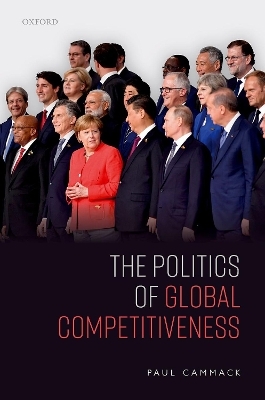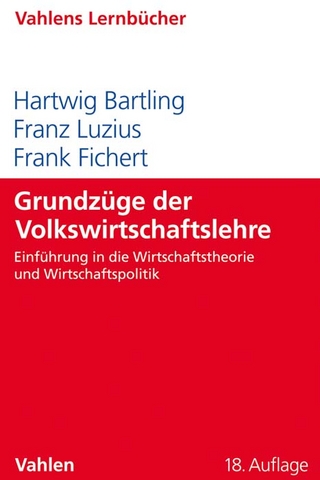
The Politics of Global Competitiveness
Seiten
2022
Oxford University Press (Verlag)
978-0-19-284786-7 (ISBN)
Oxford University Press (Verlag)
978-0-19-284786-7 (ISBN)
This book documents the recent developments of what Marx called the 'general law of social production', and the leading roles of the Organisation for Economic Cooperation and Development and the World Bank as advocates of a single global model of capitalist development.
Marx predicted in Capital (1867) that as capitalism became global, patterns of work would be transformed, and workers would need to develop versatility, flexibility, and mobility. This 'general law of social production', as he called it, is now in evidence all around us, in global value chains, 'zero hours' contracts, and contract work organised through digital platforms. It results from competition between capitalists, scientific and technological revolutions in production, and incessant advances in the division of labour as production processes are broken down into ever smaller steps. This book documents the leading roles of the Paris-based Organisation for Economic Cooperation and Development and the Washington-based World Bank as advocates of these developments. They do not, as generally supposed, simply represent the interests of the advanced economies or the 'West' and their transnational corporations. They promote a single global model of capitalist development, without limits and on a genuinely global scale. It calls upon all states to 'adjust' continually to the structural and social demands of competitiveness, which they see as essential to the global hegemony of capital over labour. The OECD and the World Bank propose policies that give girls and women equal access to education and paid work, reform welfare to 'make work pay', introduce flexible labour contracts that make 'hiring and firing' easier, focus education on skills that boost employability, and draw workers in the developing world from the 'informal' sector into the formal sector, where they can be more productive. This is the politics of global competitiveness.
Marx predicted in Capital (1867) that as capitalism became global, patterns of work would be transformed, and workers would need to develop versatility, flexibility, and mobility. This 'general law of social production', as he called it, is now in evidence all around us, in global value chains, 'zero hours' contracts, and contract work organised through digital platforms. It results from competition between capitalists, scientific and technological revolutions in production, and incessant advances in the division of labour as production processes are broken down into ever smaller steps. This book documents the leading roles of the Paris-based Organisation for Economic Cooperation and Development and the Washington-based World Bank as advocates of these developments. They do not, as generally supposed, simply represent the interests of the advanced economies or the 'West' and their transnational corporations. They promote a single global model of capitalist development, without limits and on a genuinely global scale. It calls upon all states to 'adjust' continually to the structural and social demands of competitiveness, which they see as essential to the global hegemony of capital over labour. The OECD and the World Bank propose policies that give girls and women equal access to education and paid work, reform welfare to 'make work pay', introduce flexible labour contracts that make 'hiring and firing' easier, focus education on skills that boost employability, and draw workers in the developing world from the 'informal' sector into the formal sector, where they can be more productive. This is the politics of global competitiveness.
Paul Cammack taught at the University of Manchester, Manchester Metropolitan University, and City University, Hong Kong, before retiring in 2015. His initial interest in Latin American and Third World politics developed into a broader focus on global political economy, and most recently on the politics of social reproduction. His main empirical interests are in politics of international organisations, which he addresses from a classical Marxist perspective.
Introduction
1: Social production in a capitalist world market
2: The OECD and the world market
3: The World Bank and the global rule of capital
4: The general law of social production
5: The social politics of global competitiveness
6: Capitalising on COVID-19?
| Erscheinungsdatum | 21.02.2022 |
|---|---|
| Verlagsort | Oxford |
| Sprache | englisch |
| Maße | 164 x 240 mm |
| Gewicht | 486 g |
| Themenwelt | Wirtschaft ► Allgemeines / Lexika |
| Wirtschaft ► Volkswirtschaftslehre ► Wirtschaftspolitik | |
| ISBN-10 | 0-19-284786-4 / 0192847864 |
| ISBN-13 | 978-0-19-284786-7 / 9780192847867 |
| Zustand | Neuware |
| Informationen gemäß Produktsicherheitsverordnung (GPSR) | |
| Haben Sie eine Frage zum Produkt? |
Mehr entdecken
aus dem Bereich
aus dem Bereich
Theorie und Anwendung
Buch | Hardcover (2024)
Vahlen, Franz (Verlag)
CHF 55,70
wie sich unsere Wirtschaftspolitik ändern muss, damit wir globale …
Buch | Hardcover (2024)
Wiley-VCH (Verlag)
CHF 55,95
Einführung in die Wirtschaftstheorie und Wirtschaftspolitik
Buch | Softcover (2019)
Vahlen, Franz (Verlag)
CHF 27,70


